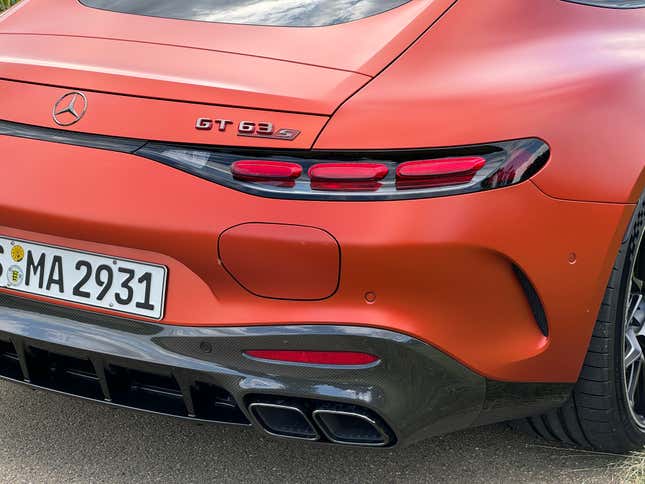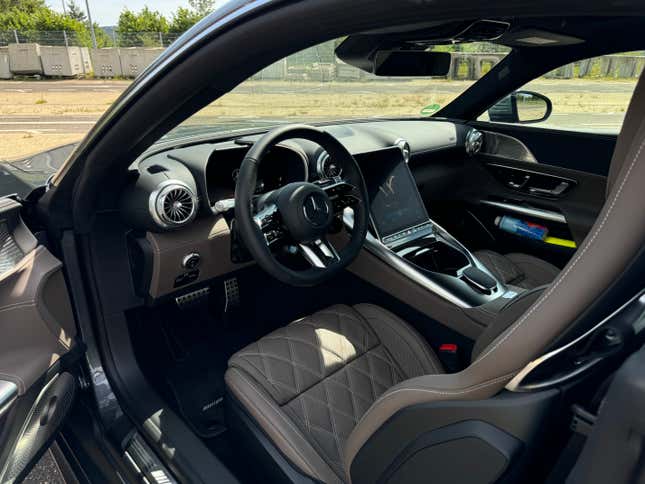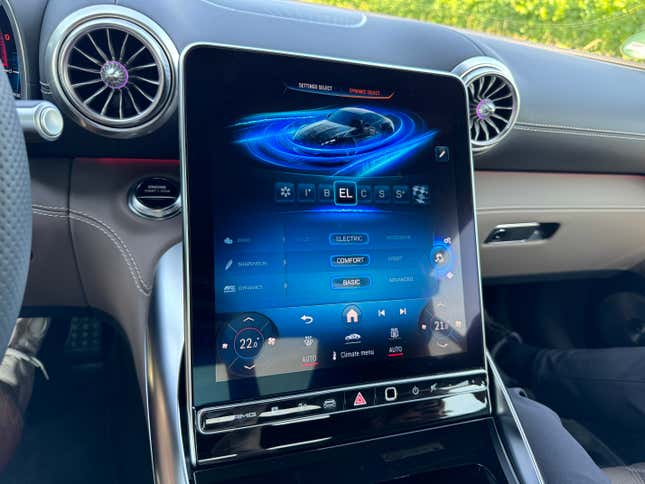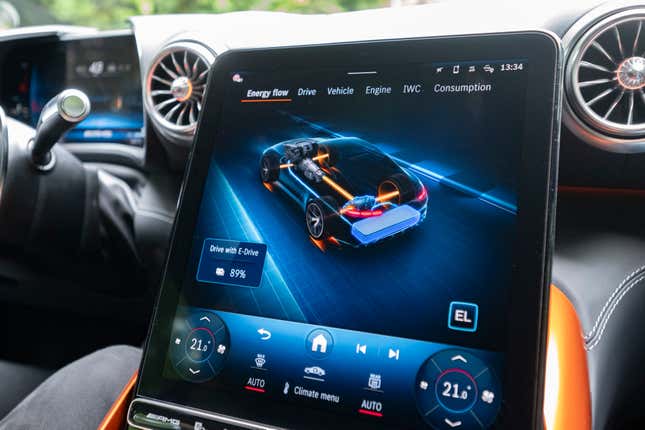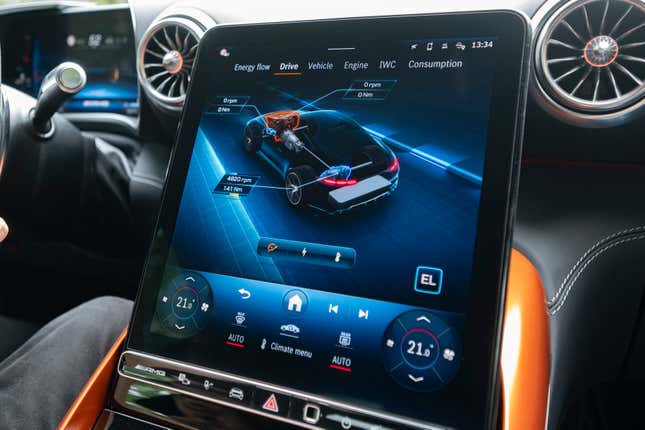At face value, the 2025 Mercedes-AMG GT63 S E Performance looks like yet another hybrid only created to appease emissions regulators and set new horsepower records. While yes, its 805 horsepower makes the plug-in-hybrid GT the quickest AMG ever, its small battery pack and meager electric-only range make the hybridization seem pointless. Two days of driving the GT63 E Performance around Germany reveal that’s far from the case.
The new GT makes the most of the marvels of electrification. It’s one of the most genuinely usable plug-in hybrids I’ve ever driven, offering much greater electric-only operation than its small stated range suggests thanks to clever powertrain tuning. The GT63 S E Performance is as good at puttering around town as it is blasting down the autobahn or racing along a twisty road, and that breadth of ability wouldn’t be possible if it weren’t a plug-in hybrid.
Full disclosure: Mercedes flew me out to Germany to drive both the GT63 and SL63 E Performance hybrids around the greater Stuttgart area, putting me up at three different hotels including an incredibly nice one right along Lake Constance. We also got to take a tour of the AMG engine factory and ride along in the GT63 Pro at Mercedes’ Immendingen test facility. Half of our group got stuck in Amsterdam thanks to the CrowdStrike outage, and Mercedes’ travel department graciously put us up in hotels and made sure we were on flights back to America as soon as possible, which I am very grateful for.
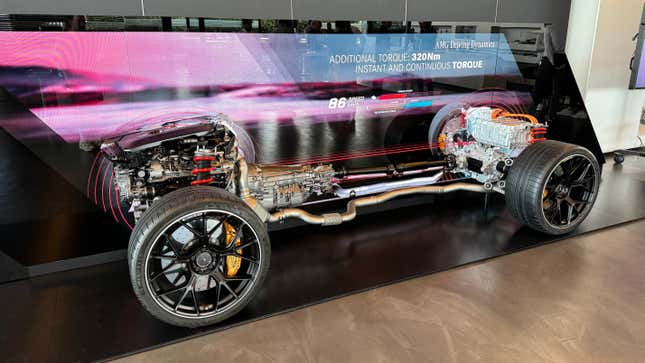
The GT63 S E Performance’s plug-in-hybrid powertrain is the same one found in the new S63, and the numbers are nearly identical — the GT has a little more power and a little less torque. Under the hood is AMG’s familiar twin-turbo 4.0-liter V8 engine, which in the E Performance makes 603 horsepower and 627 pound-feet of torque, 26 hp and 37 lb-ft more than a standard GT63. Unlike the previous-gen GT’s 7-speed dual-clutch gearbox that was a rear transaxle configuration, the new GT has a 9-speed dual-clutch transmission mounted more traditionally right behind the engine and sending power to all four wheels.
That change was partially to make room for the hybrid’s electric motor, which is mounted directly on the rear axle and has its own two-speed transmission and limited-slip differential. The electric motor makes 201 hp and 236 lb-ft, and its torque is sent through the same driveshaft as the gas engine’s, so in EV mode power can be sent to any wheel and distributed both between the axles or to either side of the car as needed. Above the rear axle is the Formula 1–inspired 400-volt battery pack that has 4.8 kWh of usable capacity (6.1 kWh total), with a constant flow of coolant around the cells to maintain a stable temperature of 113 degrees fahrenheit. The battery can enable a 94-hp continuous output or that 201-hp peak, and it can be charged at up to 3.7 kW.
Add all of that up and the GT63 S E Performance makes 805 horsepower and 1,047 lb-ft. Mercedes says it will hit 60 mph in 2.7 seconds using launch control, 0.4 seconds quicker than the gas-only GT63 and a tenth or two quicker than the AMG One hypercar. It feels even more rapid than that in real life, but power delivery is more linear and less dramatic than in the non-hybrid GT. It’s a strong, constant wave of power that never lets up, especially noticeable in the mid-range or when powering out of a corner.
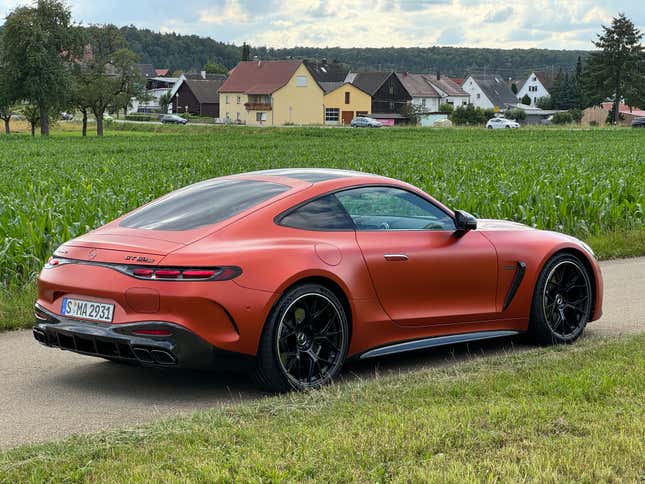
Much of our drive back to Stuttgart from Lake Constance involves unrestricted sections of the autobahn, where the GT63 is fabulous. Regardless of what speed I’m already going or which drive mode I’m in, when I floor the accelerator the car gains speed at a rapid pace but without any unsettling motions. I get the GT up to 185 mph, a new personal record that’s just shy of its 199-mph top speed, and the car feels totally calm and stable. It’s not even that loud in the cabin at such high speeds, and as long as I’ve got the suspension in the softest setting it’s more than comfortable enough to make high speeds relatively stress-free.
People will focus on the GT’s 8-mile range (on the European cycle), which yes, is low when compared to basically any other plug-in hybrid on the market. That figure doesn’t tell the whole story, though. In the real world, thanks to the way AMG tuned the hybrid system, the GT’s battery is constantly getting refilled so electric power is always available and ready to be deployed as needed. This is the E Performance’s real ace in the hole.
In Comfort mode the powertrain prioritizes using only electric power whenever it can, though it will never take the battery below 25 percent, where the estimated range is just a mile or two. The operation is so smooth most of the time I barely even notice when the car switches between electric and combustion power; even under heavier acceleration when I meet the kick-down and the engine comes in at a higher rpm it’s a nice transition. In Sport, but especially Sport+ and Race, the powertrain loads the battery as quickly as it can — and it really does it quickly. Starting with a nearly depleted battery, after just a few minutes of driving in Sport+ the battery is back to fully charged, and that’s without driving like a lunatic, though the harder you drive the quicker it’ll fill up. It’s still constantly using the electric motor and stored energy to increase performance, too.
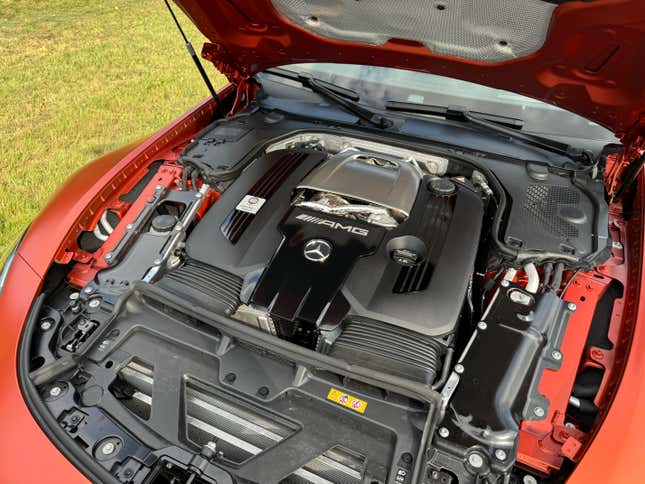
AMG’s solution is a game-changer in a world where many plug-in hybrids must be charged to fill up the battery and others take a long time to do it while driving. You could never once plug in the GT63 and fully enjoy the benefits of its electrification; you’ll never be left fiending for a charger after a short time of EV driving in the city. There’s also a Battery Hold mode that will keep the battery at its current state of charge, for instance if you’re getting ready to exit the freeway or know a congestion zone is coming up ahead.
The E Performance setup really shines on the country roads outside AMG’s headquarters Affalterbach, where excellent single-lane twisty roads run through small villages. Despite its mega performance figures the GT63 can be wrung out pretty hard on these tight roads, never feeling unwieldy or too powerful for the street. Acceleration is merciless in Race mode, accompanied by throaty V8 exhaust noise that emits lots of pops and bangs that always sound natural. Need to pass a slow-moving van or tractor? No matter the drive mode, even a light squeeze of the accelerator is enough for the V8 to roar to life and thrust me ahead.
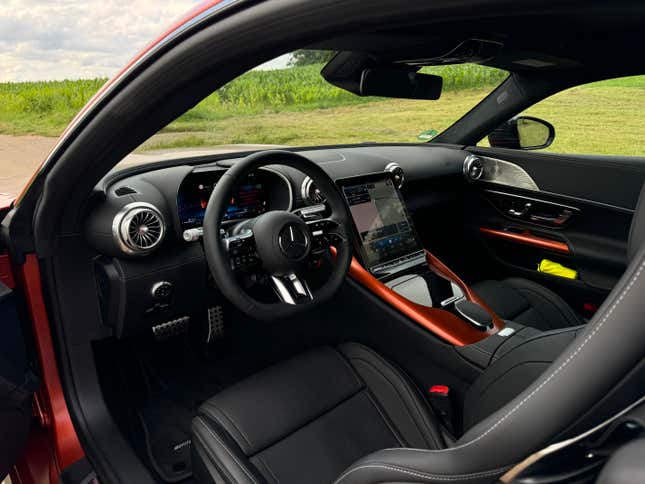
Clicking the steering wheel–mounted drive mode knob into Electric mode to immediately cut off the engine and waft silently through the quaint farm towns is lovely. In any ICE-only sports car like the GT, even going into a less-sporty drive mode could still cause a ruckus and be annoying in town, whether that be due to droning exhausts, jerky transmissions or grabby brakes. In its EV mode the GT63 E Performance is brisk off the line, but it’s a far cry from your typical EV levels of acceleration, especially if accelerating above 40 mph. Press down the accelerator enough and the engine will automatically kick in, with the car switching to Comfort mode. The GT will hit around 80 mph under just electric power, at least, and the power is enough to keep up with normal highway traffic. Mercedes didn’t give the GT63 outrageous fake noises like its other EVs, with just a subtle warbling sound and some cool whizzes emanating throughout the cabin, but toggling the sound into its louder mode does up the intensity.
There are four different levels of regenerative braking to choose from, from a no-regen sailing setting to one-pedal driving that can almost bring the car to a complete stop and recuperate more than 100 kW of energy back to the battery. (Even in EV mode the car creeps forward like an ICE car, which is annoying.) The max regen setting is available in all but the Race drive mode, but if the battery is at above around 65 percent the car won’t let you use the strongest two settings. The regen is blended in normal driving, but under max braking or above 0.3 g the car uses the friction brakes only. It feels seamless and natural even when driving quickly, and in the sportier drive modes the car will make aggressive downshifts when decelerating just using regen. And don’t worry, the six-piston calipers and 16.5-inch discs up front and single-piston calipers and 15-inch discs at the rear do an excellent job of quickly bringing the car down from autobahn speeds without drama.
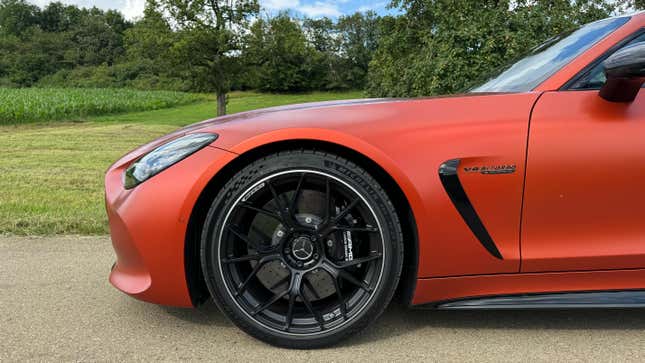
Actually toggling through the regen modes is a bit annoying, at least if you want to change it on the fly. You have to press the round screen on the right-hand steering wheel control that’s used to select the different drive modes, then twist the knob to choose your setting. I don’t really know what a better solution would be — it couldn’t be the paddles, as those are needed for actual shifting — but the car does remember the last regen setting you used even when moving through the different drive modes.
While it doesn’t have the same sharp edge as the outgoing car, I think the new GT is a blast to drive. Sure, you feel its (likely) 5,000-ish-pound heft, but the car manages its weight well enough that I don’t really care. The standard Active Ride Control suspension does away with traditional anti-roll bars in favor of active hydraulic components that keep the GT totally flat through corners, and even on optional 21-inch staggered-width wheels ride quality is good if quite firm. Rear-axle steering is also standard, improving low-speed maneuverability and high-speed stability. I find it to be a confidence-inspiring car to drive, with nicely tuned steering and handling dynamics that are fun enough to rival the 911 without giving up on luxe grand touring stuff. It is called GT, after all.
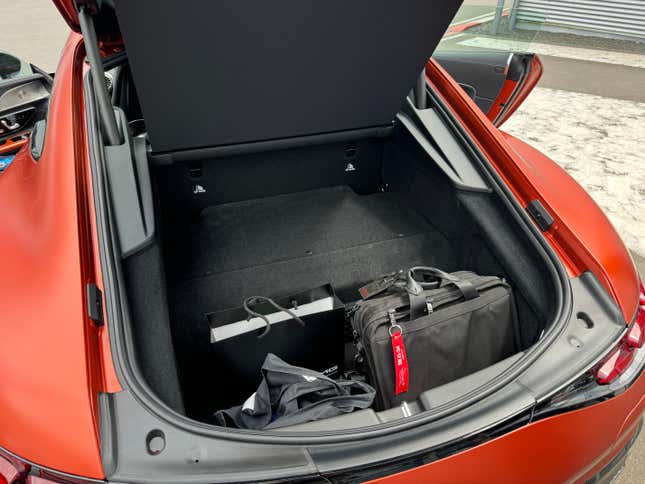
The battery’s positioning above the rear axle eats up a lot of the cargo area, but the GT still has enough room under its hatch for a couple’s worth of weekend luggage, and you can always fold down the rear seats or use them as an additional parcel shelf to get more space. The central touchscreen has a bunch of display pages that show the flow of energy through the powertrain and other hybrid-specific stuff, but otherwise the cabin is identical to other GTs. It’s a great place to spend time; a lot more luxurious than the first-gen GT, retaining a sporty cockpit feel while being much easier to see out of. Much, much easier. New technology features like an excellent 360-degree camera and class-leading driver-assist systems help make the redesigned GT even better to live with.
All of the GTs I drive have the optional performance seats, which have a racing bucket appearance with fixed headrests. They’re plenty adjustable, including the bolsters, and offer heating and ventilation. Even after eight hours in the car the buckets feel comfortable and supportive, but I think I’d go for the standard seats — I want their massage function that the buckets lack. And you can option a nice panoramic sunroof that doesn’t impact headroom too badly, and it has a legit sliding sunshade.
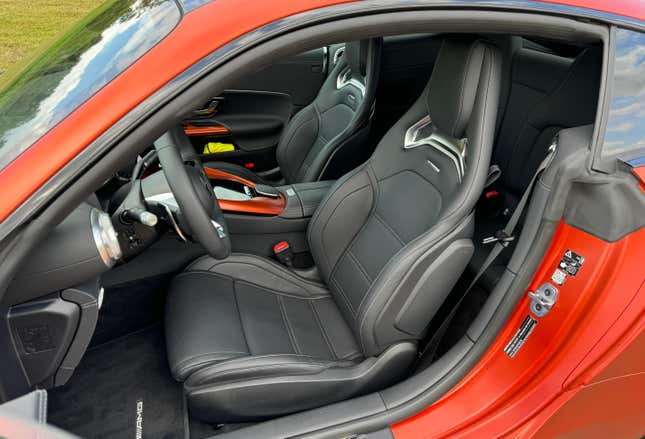
The only tells from the outside that you’re looking at a hybrid GT are the red trim around the rear badge and the charge port in the rear bumper, the only location it could easily be placed in. While I do miss the first-gen GT’s, uh, phallic proportions, I think the new car looks fabulous. It’s at once lithe and muscular, with wide hips and a purposeful stance. It’s different enough from the SL, too, thanks to the larger mouth, simpler bumper intakes, vertically oriented headlights and cool three-dimensional taillights.
Mercedes is expanding its Manufaktur program for the GT, offering a host of new visual options and colors to choose from. I love the Copper Orange Magno paint of some of our test cars, and the chrome exterior trim package and light gold wheels of others. The Manufaktur interior options add leather to more surfaces and quilted stitching patterns, plus color-matched steering wheels and deep-pile floor mats.
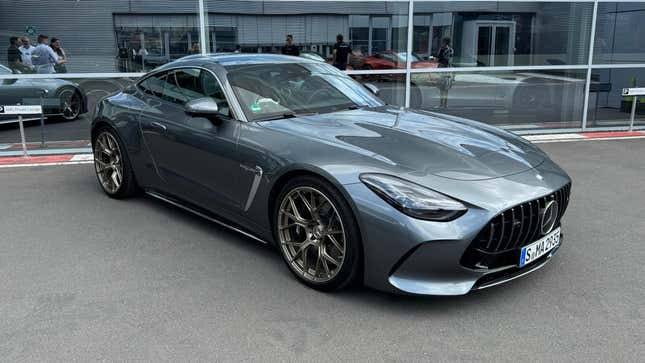
As Hannah Montana said in her 2006 smash hit Best of Both Worlds, “Chill it out, take it slow, then you rock out the show, you’ve got the best of both worlds.” Mercedes should use that song in the GT63 S E Performance’s ads. Use up your battery to calmly waft through the city, charge it back to full while getting entertained by the V8, rinse and repeat — the E Performance powertrain is always primed and ready for either, all without ever having to think about it. If you end up plugging the car in at home or at the mall, that’s just a bonus.
Mercedes says the GT63 S E Performance will reach U.S. dealers at the end of this year, and while pricing has yet to be announced, expect it to start at around $200,000, about $25,000 more than a normal GT63. At that price, the GT PHEV doesn’t have much competition. The 911 GTS T-Hybrid is the easiest answer, the more perfect sports car but without the AMG’s EV benefits, and plug-in-hybrid supercars like the McLaren Artura are more expensive and less dailyable. There aren’t really any electric sports cars on the market yet, either. For now, if you want the best of both worlds, the GT63 S E Performance is your car.


